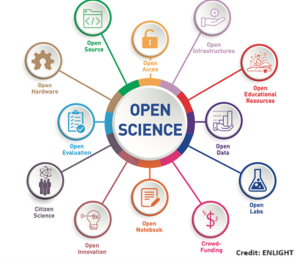An analysis of the effects of sharing research data, code, and preprints on citations
Posted on: 5 July 2024
Preprint posted on 24 April 2024
Sharing is caring! Open Science practices increase the impact of research articles as measured by citations; meaning these practices not only benefit the scientific community as a whole, but also individual researchers’ visibility.
Selected by Reinier Prosee, Priyanka Pant, Katarzyna Lepeta, Shalini Roy ChoudhuryCategories: scientific communication and education
Introduction
In the changing landscape of scientific research, Open Science practices hold the promise to enhance the accessibility, transparency, and impact of scientific work. These practices include the early sharing of research (through e.g. preprints), the sharing of data and code, Open Access policies and public engagement, among others. By making research freely accessible, Open Science practices help to democratise knowledge and break down barriers that can hinder scientific progress. Many researchers, especially those in developing countries, face significant challenges in accessing paywalled research papers due to limited funding. Preprints and other open access resources eliminate these barriers, enabling a more equitable distribution of knowledge and facilitating international collaboration.
The preprint we highlight here delves into the benefits of Open Science practices, highlighting their potential to significantly boost the visibility of research and foster a more inclusive and collaborative scientific community.

The Study
The research team, made up of active researchers and publishing professionals, evaluated whether data sharing, code sharing, and preprint posting, individually or in combination, lead to a higher citation impact compared to similar publications without these practices. This study uniquely examines the combined effect of Open Science practices. To do so, they used PLOS’ Open Science Indicators version 5, which includes 121,999 research articles.
From 2018 to 2023, data sharing increased by 5%, with repository and online data sharing up by 9% and 10%, respectively. Code sharing grew by 6%, and preprint posting surged by 15%. The adoption of Open Science practices varies by research field, each facing unique challenges. While some practices, like preprints and data sharing, show significant positive effects on citation rates (20.4% and 3.9% respectively), others, such as code sharing, do not have a notable impact. Importantly, combining practices, such as posting preprints and sharing data in repositories, can lead to an average citation increase of 24.3%. However, the effectiveness of these practices differs across disciplines.
Key Takeaways
The main takeaway from this study is the profound impact that Open Science practices, specifically preprinting and data sharing, can have on the visibility of research. The study provides robust evidence that research shared as preprints tends to receive more citations compared to traditional publication methods. This increase in citations is not just a metric of academic recognition but also an indicator of the broader dissemination and influence of the research within the scientific community.
Furthermore, the study highlights that sharing additional data through supplementary materials can also enhance citation rates, underscoring the importance of making research outputs as comprehensive and accessible as possible.
Open Science: Changing research by promoting a collaborative culture
The ethos of Open Science is rooted in collaboration and transparency. The preprint underscores the importance of moving towards a more open and cooperative research culture, where scientists share their work widely and in an accessible manner. By breaking down competitive barriers and encouraging data and code sharing, Open Science can help to create a more level playing field for researchers across different regions and disciplines.
The traditional focus on high-impact journals often leads to valuable research being overlooked. Open Science practices provide a platform for sharing such research, ensuring that all valuable findings, regardless of their perceived citation potential, are available to the global scientific community. This openness not only prevents duplication of effort but also encourages the exploration of diverse and innovative research questions.
The potential benefits of Open Science clearly go beyond citation metrics. As the preprint suggests, it would be intriguing to explore how Open Science practices might also increase the number of collaborations, material requests, and other forms of academic engagement. This collaborative spirit is essential for advancing science in a way that is inclusive and mutually beneficial.
Questions for the preprint authors
- How difficult would it be to extend your findings by including other parameters, such as the effect on Open Science practices on the number of collaborations, career progression etc.?
- Did you observe any correlations between citation rates and the specific (PLOS) journal a study was published in?
- Did you look at the (change in) citation dynamics of included preprinted studies both before and after they were formally published?
- Could you speculate on reasons why your study did not find a citation advantage for code sharing while three previous studies did?
- What are your impressions of the adoption of (and its impact on) Open Science practices in research fields that were perhaps not represented in this study?
- Based on your findings that preprinted work is more visible, do you feel there is a possibility that researchers will post more, but lower quality preprints just to boost their overall citation numbers?
doi: https://doi.org/10.1242/prelights.37807
Read preprintSign up to customise the site to your preferences and to receive alerts
Register hereAlso in the scientific communication and education category:
Identifying gaps between scientific and local knowledge in climate change adaptation for northern European agriculture
Anatolii Kozlov
Spurring and Siloing: Identity Navigation in Scientific Writing Among Asian Early-Career Researchers
Jeny Jose
LGBTQ+ realities in the biological sciences
Reinier Prosee et al.











 (No Ratings Yet)
(No Ratings Yet)